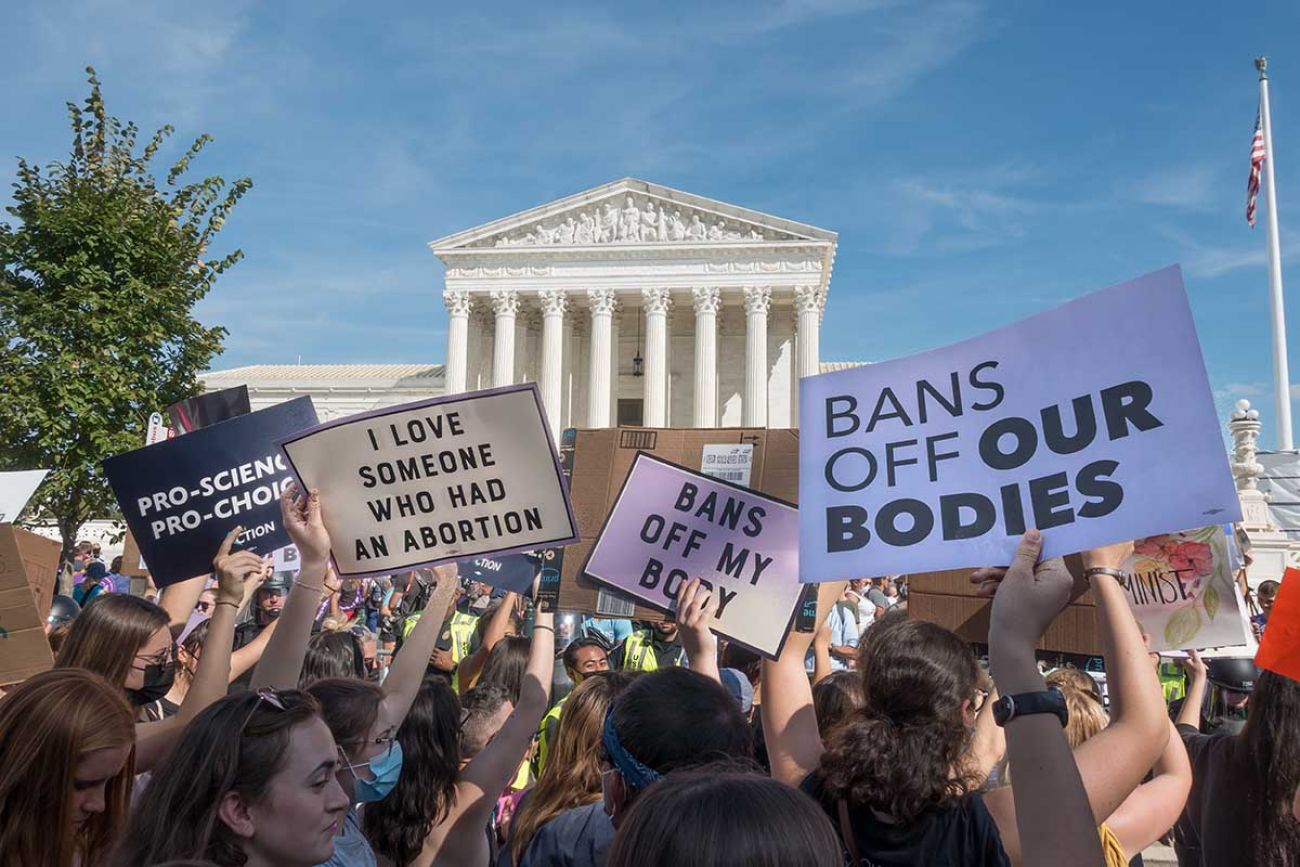Leaked Supreme Court draft would overturn Roe, upend Michigan abortion law

A leaked U.S. Supreme Court opinion shows at least five conservative justices supporting the reversal of Roe v. Wade, the abortion rights opinion from 1973. Its impact would be enormous in Michigan. (Shutterstock photo by Bob Korn)
The battle over abortion access in Michigan received a seismic jolt late Monday when a leaked draft opinion showed the U.S. Supreme Court is poised to overturn Roe v. Wade, the nearly 50-year-old law that made the procedure legal nationwide.
Michigan is one of nine states with pre-existing laws on the books criminalizing abortion, which would go into immediate effect if the 1973 case is overturned by the conservative-majority federal court.
At least five of the most reliably conservative justices on the nine-member court had signed onto a February draft, written by Justice Samuel Alito, to overturn Roe, according to an opinion obtained by the news site Politico. Chief Justice John Roberts was not among them and there is no way of knowing if he too would eventually support Alito’s position.
Alito wrote that Roe was “egregiously wrong from the start” in declaring that the U.S. Constitution created a right to abortion.
Related stories:
- If Roe v. Wade falls, expect Michigan abortion clinic closures, legal fights
- Abortion in Michigan: State bucks trend; rate increases as access dwindles
- Michigan abortion law: What you should know if SCOTUS overturns Roe
- With Roe in doubt, Gretchen Whitmer moves to protect abortion in Michigan
- 2022 Michigan petition drives tracker: What to know about election proposals
- A Michigan abortion ban could ‘shock’ state politics ahead of 2022 election
- Old Michigan law could ban abortion, as Texas ignites Roe v. Wade debate
“We hold that Roe and Casey must be overruled. It is time to heed the Constitution and return the issue of abortion to the people’s elected representatives.”
“Our decision returns the issue of abortion to those legislative bodies, and it allows woman on both sides of the abortion issue to seek to affect the legislative process by influencing public opinion, lobbying legislators, voting and running for office,” Alito wrote. “Women are not without electoral or political power.”
The draft could change, and a formal opinion isn’t expected until possibly June in the Supreme Court case, which weighed a Mississippi law that would make most abortions illegal after 15 weeks of pregnancy. Roe allowed, at a minimum, roughly 24 weeks.
Reverberations from the leaked draft were immediate nationwide, and especially in Michigan, where abortion access is already front-and-center in this year’s campaigns for governor and attorney general.
Democratic incumbents, Gov. Gretchen Whitmer and Attorney General Dana Nessel, have vowed to protect access and ignore the old criminal law, while Republicans vying for nomination generally oppose abortion and would leave the decision up to the state Legislature.
A petition drive, Reproductive Freedom for All, is proposing a ballot measure in November that would enshrine abortion rights into the state constitution.
“I will fight like hell to make sure abortion remains safe, legal, and accessible in our state,” Whitmer tweeted Monday evening.
Republican Matt DePerno, Republican candidate for attorney general, called the draft, if it becomes the court’s decision, “a great win for the unborn and for states' rights,” while Nessel posted a video of DePerno saying he would enforce abortion bans even in cases of rape, incest and when the mother’s life is in danger.
Nessel wrote on Twitter: “Women in Michigan should be terrified right now. Vote like your life depends on it.”
Polls in Michigan have shown a majority of residents consider themselves pro-abortion rights. Nationwide, about 60 percent of Americans say abortion should be legal in most circumstances, a level that has remained the same for about 30 years.
The most immediate issue in Michigan now is Whitmer’s request last month to the Michigan Supreme Court to reaffirm a woman’s right to an abortion under the state constitution.
Whitmer argued the 1931 Michigan law criminalizing abortion violates the due process and equal protection clauses of the Michigan Constitution, depriving women of basic reproductive health protections.
“To participate fully and equally in society,” Whitmer, a first-term governor who faces reelection in November, argued in a 27-page court filing. “Michigan women need access to abortion.”
Whitmer’s complaint named as defendants prosecutors in 13 Michigan counties in which 27 abortion providers are located, and she invoked a rarely-used court rule that allows the governor to directly ask the Michigan Supreme Court to intervene and settle important issues promptly.
That same day, Nessel reiterated she will not enforce the older criminal law that bans abortion, saying in a statement prepared for reporters that she’d “take no part in driving women back into the Dark Ages and into the back alleys.”
And prosecutors in seven of the 13 counties — all Democrats — released a letter vowing not to enforce the 1931 law if it were to be revived.
Right to Life of Michigan called Whitmer’s move “a telltale sign” that she feared other efforts to erect post-Roe abortion protections in Michigan would fail. Genevieve Marnon told Bridge at the time that the state Supreme Court already upheld the statute in a ruling shortly after the 1973 federal Roe decision.
Right to Life has joined a coalition called Citizens to Support Michigan Women and Children to work against the constitutional amendment by abortion rights groups, its legislative affairs director said at the time. And Reproductive Freedom for All — a coalition of abortion rights advocates that includes the American Civil Liberties Union of Michigan and Planned Parenthood of Michigan — is pushing for a constitutional amendment that would explicitly affirm Michigan women’s rights to “reproductive freedom.”
There were 29,669 abortions performed in the state in 2020, roughly 40 percent below 1987, when the number of abortions in the state reached its peak, according to the Michigan Department of Health and Human Services. But 2020 represented an increase from 2019, when there were 27,339 abortions in Michigan.
The Guttmacher Institute reported that 35 percent of Michigan women live in counties with no abortion clinics.
Meanwhile, protesters on both sides of the issue gathered at the U.S. capitol late Monday after Politico published the leaked opinion, which was written in February.
Alito argued, in part, that the U.S. Constitution does provide protections for abortion. It is instead, he said, up to lawmakers, who “may regulate abortion for legitimate reasons,” according to the draft.
“We do not pretend to know how our political system or society will respond to today’s decision overruling Roe and Casey,” Alito wrote, referring to a 1992 case that, for the most part, upheld Roe.
Still, he continued, “the authority to regulate abortion must be returned to the people and their elected representatives.”
See what new members are saying about why they donated to Bridge Michigan:
- “In order for this information to be accurate and unbiased it must be underwritten by its readers, not by special interests.” - Larry S.
- “Not many other media sources report on the topics Bridge does.” - Susan B.
- “Your journalism is outstanding and rare these days.” - Mark S.
If you want to ensure the future of nonpartisan, nonprofit Michigan journalism, please become a member today. You, too, will be asked why you donated and maybe we'll feature your quote next time!








